Hire Standards: Better Fit
 By Brenda Jacobsen
By Brenda Jacobsen
It’s the age of change, and the workplace is shifting. The way we did business yesterday has been radically transformed by the speed of mobile data.This evolving workplace is set against a wobbling global financial landscape, focused on rebalance and restructure.
Today, recruiting the right leaders to navigate is critical to advance companies through this paradigm shift. Team players too must be in synchronicity. Recruiters must find the right fit, aligning potential candidates with the company’s core culture and creating workplaces where employees feel engaged and inspired.
While top employers are successful at attracting, retaining and enjoying the workforce cream that rises to the top, economics has played a key role in the dynamics with more candidates with deep skills and experience vying for fewer jobs.
B.C.’s Big Picture: Top Talent, Tough Times
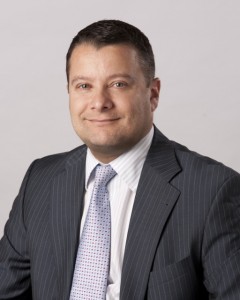
Andrew d’Eca vice president, business development and general manager of Angus One Professional Recruitment
Andrew d’Eça, vice president, business development and general manager of Angus One Professional Recruitment, monitors trends and regularly screens candidates himself. He says that he hasn’t witnessed a hiring surplus like this in more than a decade.
Typically, Angus One utilizes a larger temp pool as assignments quickly turn into regular jobs for applicants; however, their temp pool is now more nimble.
“The candidate quality is now much higher. Normally, I meet with the candidates after to determine which hire is going to be a good culture fit. These days, all of the candidates are outstanding,” says d’Eça.
“We went from having too many jobs and not enough people to too many people and not enough jobs. If you look at the B.C. economy, 80 to 85 per cent is small business, and small business is what struggles and hurts the most during tough economic times,” says d’Eça.
He says that “quite simply, governments are spending less while businesses have had to restructure themselves to find other ways to run leaner.”
“Some companies have hiring freezes or have doubled up on positions. They’ve simply taken that work and re-allocated it to two or three other people. We’ve seen a lot of people take early retirement. Businesses that have been for sale and have been up and down in the acquisition market are just handing out severances and early retirement packages like crazy,” d’Eça says.
“The fact of the matter is that B.C. businesses, overall, are doing less economy. They’ve scaled back. On the contrary, we have an office in Calgary that’s absolutely booming. It’s a really different world in Alberta with the oil sands and the oil and gas industry,” says d’Eça.
Regardless, d’Eça believes B.C. is on the up economically. “I’ve seen very mild and moderate requests for orders and the number of active employees we would have in the field. So we’re a good indicator of the economy because we’re one of the first fingers on the pulse. When things start to turn around, we feel it early. When things are going sour, we tend to be on the tail end of that.”
Culture Connection Key to Recruitment

Stephanie Corker, head of recruitment, lululemon athletica
Despite the uncertain economy, top employers such as lululemon athletica remain strong and continue to attract a steady stream of applicants, nearly 10,000 people per week.
Stephanie Corker, head of recruitment, is part of lululemon athletica’s global talent acquisition engine which spans San Francisco, Hong Kong, Australia—and naturally, Vancouver
According to Corker, having good staff and the right fit has made a huge difference in helping them ride the recession. “When we think of going into new markets and our growth, we think of our people first. If we don’t have the right people, we will slow down entering those markets.”
She believes that economic and environmental factors cause people to really pause and ask: “What does it mean to have a job now and who do I want to be associated with?”
“I think to lululemon’s benefit, we really care that we’re hiring people who are up for the task of taking on their health, the environment and the economy. Personal responsibility is the heartbeat of lululemon. Our culture is one of greatness, innovation, and choice,” says Corker.
“The attributes that would make great hires when we started 13 years ago remain the same today. We’re up to elevating the world from mediocrity to greatness and we want people that live great lives already,” Corker says. “And there’s a scale at which they’re great. We’ve been blessed. Some people are saving Africa and other people are making a dent in what it means to be a mom. What matters most is that we’re finding people who want to show up and make their mark on the world.”
Corker translates ‘showing up’ into being responsible for your career, including the contribution you make in the office and how you relate outside in the world.
“When we hire people who are up for making the biggest contribution they can, the results have been phenomenal. People are inspired. And the work gets done in a fun, efficient manner. That’s what we’re up for. It’s not about talk here. It’s about what we do,” says Corker.
And the writing’s on the wall. lululemon’s internal recruiting strategy is anchored through goals which are written on the wall and celebrated when they’re achieved.
“Goals aren’t something you just write on a wall or talk about. You have to embrace and do it,” says Corker. “People may have goals to move into different departments or roles. It’s quite exciting internally, because people are setting goals that they’re really passionate about, and we get to help make those moves happen in the world and in their work life.”
Banking On a Triple Bottom Line
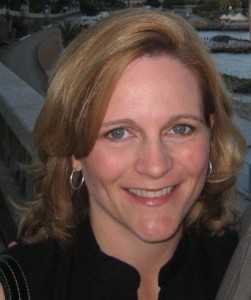
Annika Lofstrand, CHRP, director, talent management at Vancity Credit Union
Vancity is another top employer which has captured the hearts and minds of would-be employees.
“We do have a strong applicant pool for most roles or what you would call a hiring surplus,” says Annika Lofstrand, CHRP, director, talent management at Vancity Credit Union.
“Hiring for fit at Vancity has always been essential,” says Lofstrand. “We have a clear vision of redefining wealth. Simply put, we believe that if we do the right thing for our members, profitability, sustainability, and growth will come.”
She believes that when you get into hiring for fit, if people don’t understand the company’s values or believe in their business model, it won’t work for them or for the company. Her solution requires time, attention and really good listening skills.
”The three values of our organization are responsibility, integrity and innovation. The behaviours that we talk about that we need in every employee are personal or work leadership – or in the community –confidence, plus being relevant, connected and committed to our collective success,” Lofstrand says.
“In our recruitment process, we commit to a consistent positive employee experience and to respecting diversity of thought, experience and background. It’s not a one size fits all or only one type of person that fits in here. The people who choose to work here really want to make a difference in their careers,” she explains. “They want to be in a place where their job is with an organization that balances a financial, environmental and social performance or triple bottom line. We’re not telling people what their values are, but being clear about what ours are—so they can make the appropriate amount of connection that they need to be engaged, productive and effective as an employee.”
Lofstrand says that the people who want to work at Vancity actually do want to make a difference in their careers, community and their lives. “They want to be in place where their contribution is more than just dollars and cents.”
Tighter Talent Times Ahead
While most top employers now enjoy a steady stream of qualified applicants, today’s competitive global marketplace combined with an ageing workforce headed toward retirement, reveals an impending challenge.
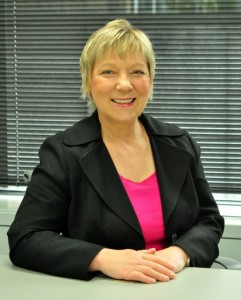
Arlene Keis, CHRP, CEO, go2
“We’re seeing a very tight labour market in many areas of the province,” says , the B.C. hospitality and tourism employment resource.
“Look at the numbers. They don’t lie. By 2020, we’ll have a million new jobs, and now we have only 650,000 kids at school. There’s a big gap. Right now, there are 20,000 more kids in grade 12 than in grade 3,” says Keis. “And other countries are after our kids too. That’s a demographic that’s now rapidly shrinking. If you get caught napping on the labour front, it’s going to come in like a big boom, even here in Vancouver.”
Keis adds that most small businesses can’t pay the big dollars that some larger corporations can to recruit and retain, and when you’re a seasonal operator with little to no local labour supply in a soft economy, survival becomes a challenge.
“We advocate to our industry—and to all industries—that there’s no one thing to do to avoid a labour crisis, even though some are now enjoying a hiring surplus. There are eight or nine things that need to be done,” Keis says. “Obviously, becoming a more competitive employer is the first thing. Then focus on retention. Look at turnover and the reason for it. Also, monitor productivity. Cast a wider recruitment net and go after underrepresented groups.”
Keis says that a strategy Go2 uses is to work together with other employers to recruit families.
“You have these companies all after the same talent. If we’re going across the country to recruit, let’s all work together. So if someone is recruited to the mining industry, for example, why not focus recruiting efforts on the family as well? In our industry, we really rely on young people, and in the North East part of B.C., the hospitality industry cannot find enough workers to cook and clean hotel rooms or to work in seasonal operations in ski resorts,” Keis says.
Global Market Forever Young
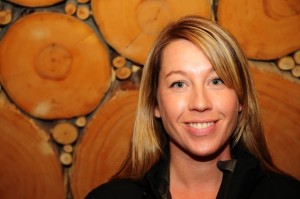
Liza Walli, director of human resources, Ziptrek Ecotours
Another company which primarily relies on the youth market and recruits overseas is Ziptrek Ecotours, a brand that was heavily leveraged during the 2010 Olympics in Robson Square and around the world.
Liza Walli, director of human resources for Ziptrek Ecotours in Whistler says that they rely on a huge supply of young workers from South Africa, New Zealand, Czech Republic, Australia, England and Canada to fill vacancies while playing on the advantages of a seasonal market.
“By nature, Whistler is a transient, seasonal resort, but it works amazingly well for us. Our peak season is summer whereas Whistler Blackcomb, the ski resort, is notoriously busy in the winter months. While we’re open 365 days of the year, we get to take advantage of those transient summer visitors who are here from between six months to a year,” says Walli.
Moreover, many of the attributes required to be an outstanding tour guide are the same that work for ski or snowboard instructors.
“It’s that coaching, guest interaction and vibrant personality that come with working outdoors. So these employees make a really easy transition to Ziptrek guides in the summer,” says Walli. “Our zipline tours have two components. First, it’s the adventure or exhilaration of ziplining,and with that comes a very technical, safety-based skill set. It’s critical. But what we really need are outgoing, positive, engaging individuals that love what we do. We need people who are inspired by our commitment to our sustainability, community and environment.”
Walli says that people who know how to care for the natural environment and are inspired by nature make exceptional guides.
“We put ourselves in the customers’ position. You’re on a tour for two to three hours with an individual who has you hanging from a line hundreds of feet in the air. Obviously, you have to trust them to build that quick relationship and connection with them. Those are the kinds of people we’re looking for.”
Schools vs. Pools of Talent
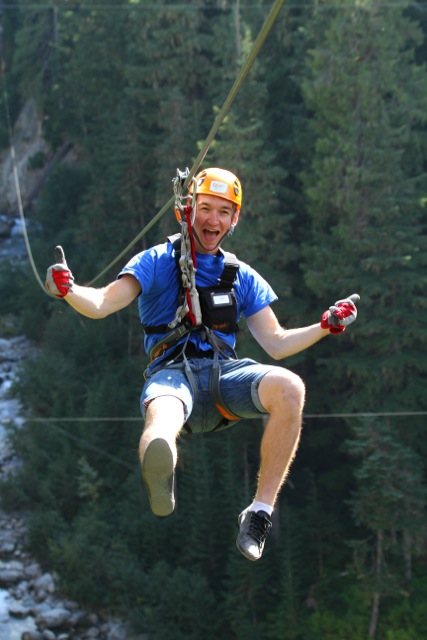 To find the right fit for ‘the fly’, Ziptrek releases their positions about a month early to partnered schools across Canada, so that people who are learning about environmental sustainability, tourism and recreation, adventure tourism, eco-tourism, all of those related subjects are good candidates.
To find the right fit for ‘the fly’, Ziptrek releases their positions about a month early to partnered schools across Canada, so that people who are learning about environmental sustainability, tourism and recreation, adventure tourism, eco-tourism, all of those related subjects are good candidates.
“If someone’s going to school for two to four to six years to learn about this content, it tells me that it has value—that they really connect with us as an individual. That’s why we go out to those schools first and enable them to have the first crack at our guide roles because we believe that right away, there’s an inherent connection to what we do and that they’re going to get value, personally, out of these jobs. That’s been our biggest helper,” Walli says. “We go out and find people who have already shown a commitment to our core values and they almost always end up to be our best employees.”
She says that in their market, they’re very aware of what good and bad turnover is.
“Bad turnover for us is leaving in peak season. And so we have a number of policies in place to ensure that doesn’t happen. We’re very clear from the beginning on what our seasonality looks like, what our requirements are, and what we expect from employees when we find people who can fulfill that commitment.”
Recruiting to Retain
Resultantly, Ziptrek has retention firmly in its sights; if an employee stays on for an entire peak season, there’s a summer bonus applied at the end of the stay. For a lot of travelers or people going back to school, that money in the bank is a strong incentive.
“We’re very clear in what we expect, and we don’t hire people who can’t deliver what we need, or as a business we feel we can’t deliver in an employee experience,” Walli says.
The bottom (or in this case zip) line, is that the jobs at Ziptrek has are plain fun.
“We take people who are inspired to be guides, but could probably not break into the market as a ski tour or rafting guide which requires a lot of technical skill sets and experience to be hired as providers. We take these amazing people that line up with our company values and we give them all the training they require from shadowing and mentoring, to technical training,” Walli says. “They also follow up with our senior guides, get ecology curriculum training, and focus on guest services. We give them everything they need from start to finish to be an exceptional guide. And so they leave us far more marketable and then go on to other jobs in the guiding industry.”
Walli believes that engaging employees comes down to providing good leadership from the mentors on the front line, day to day.
“We believe that we have the best on the front lines (literally) leading our teams,” Walli says. “They’re committed to coaching and provide relevant ongoing feedback. And we do a ton around recognition and cultural events, including opportunities to travel with the company to mega signature events such as the Super Bowl. We have a whole bunch of organic recognition to ensure that we’re recognizing excellence every day.”
Brenda Jacobsen has extensive experience as a communications specialist and HR professional in both corporate and private sectors. She now lives on the Sunshine Coast as a freelance writer and editor of the Sunshine Coast Wellness magazine (www.sunshinecoastwellness.com).
(PeopleTalk: Winter 2012)







